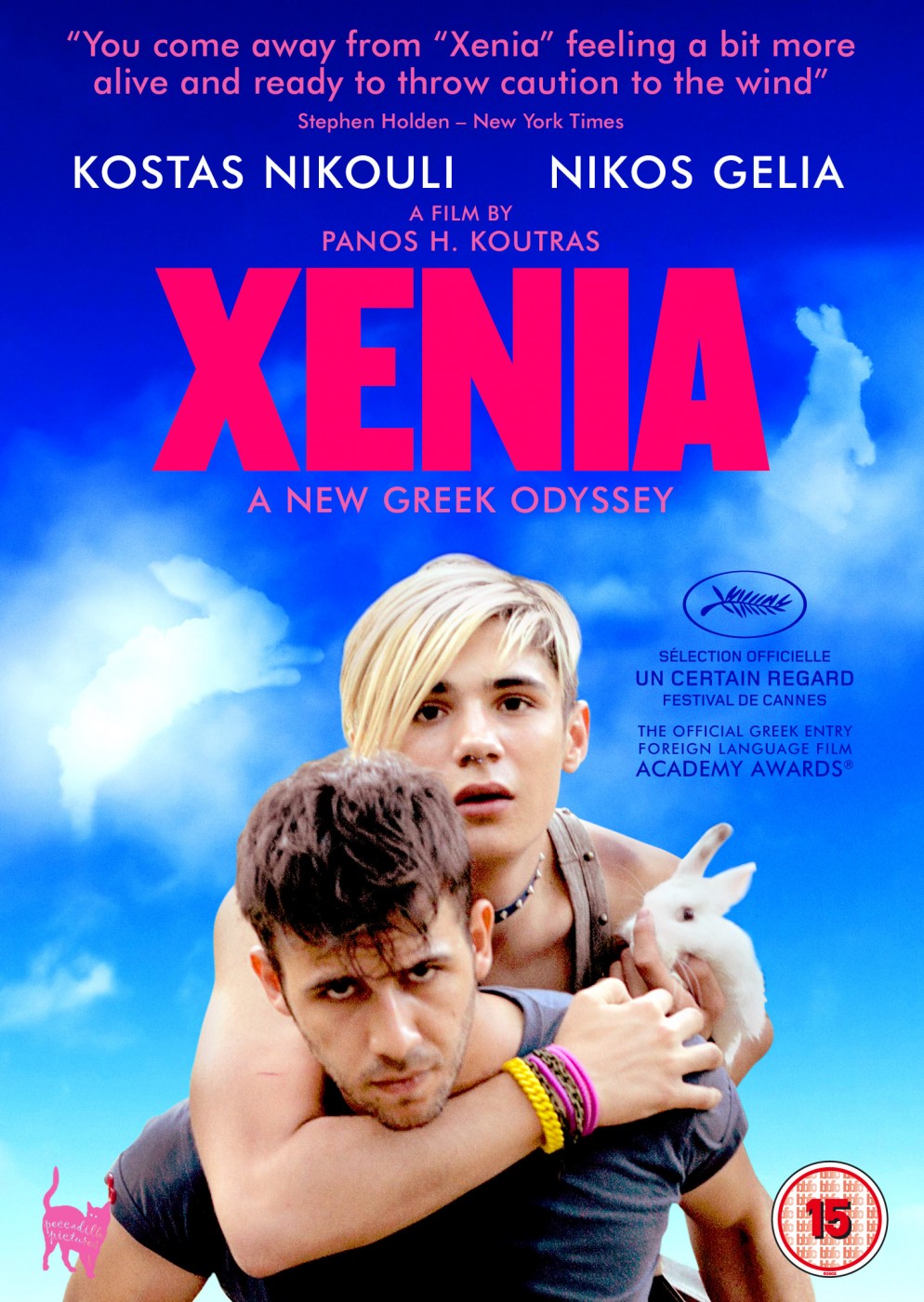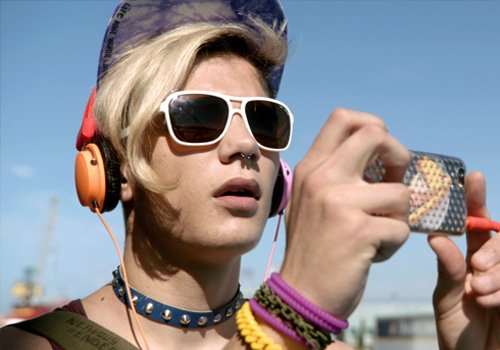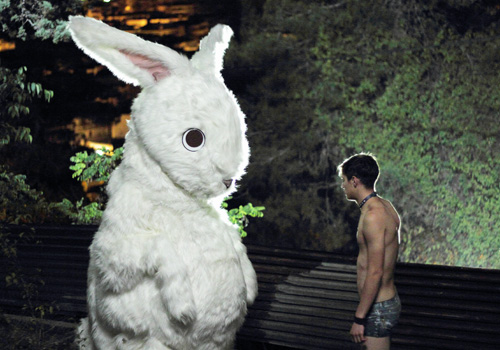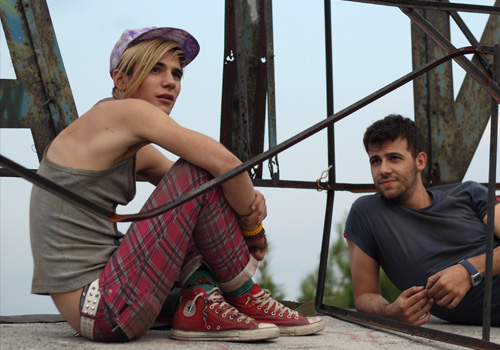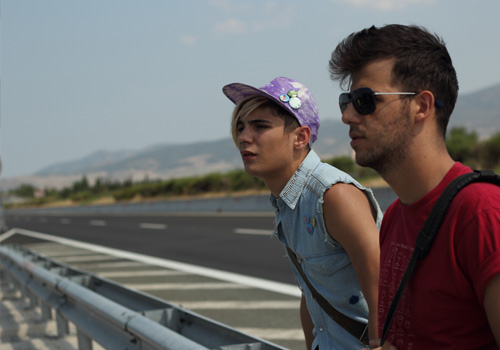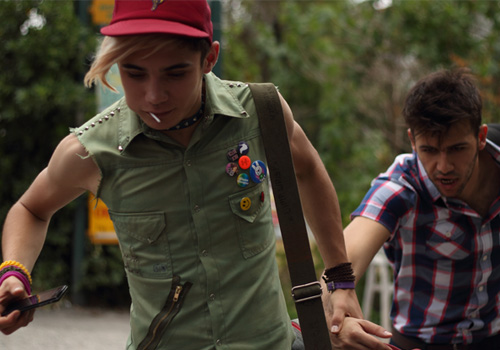Description
In today’s world, is it wise to follow, or even trust the white rabbit?
Join Dany and Ody as they journey across the wonderland of 21st Century Greece in a quest to find their last living family member – the “unmentionable” father who abandoned them 13 years before.
In this hyperreal odyssey the brothers many adventures climax at gunpoint during the Greek X-Factor auditions as they reconnect with one another and attempt to find a sense of belonging in a country that refuses to accept them.
As Athena watched over Jason during his quest for the Golden Fleece, the songs of the pop goddess Patty Pravo guide and protect the boys in their search for the father they never knew. With the stunning Greek landscape as it’s eternal backdrop XENIA is a breath of fresh air in the up and coming new Greek Weird Wave of cinema.
Interview with Panos H. Koutras:
How did this film come about?
The film could be a farewell to my younger self. I felt the need to speak about adolescence before it was too late. My years as a teenager were amongst the most intense I have ever lived. I rebelled against the system, and my only trinity was sex, drugs and rock’n’roll. I felt different, out of place. My homosexuality clearly had something to do with this. The years when I was 14 to 18 were the most crucial of my life. Without my knowing, all the choices and decisions I made back then, as to my behaviour, love, values, politics or arts, have had an impact of varying scale on the rest of my life.
I believe that youth is a beautiful age to shoot, yet I think that young people are those who suffer the most these days. They are born in a hostile world and find themselves helpless, lost. I find this moving.
Besides, I wanted to tell the story of the love between two brothers. Both blood brotherhood and spiritual brotherhood have been paramount in my own experience, especially as a gay man.
Finally, I wanted to deal with the issue of stateless children, especially in my country where birth right, jus sanguinis, prevails over jus soli. With the emergence of the far right in Greece, and more broadly speaking in the whole of Europe, the issue now reaches dramatic proportions. I am convinced that immigration is the great tragedy of our times.
Why did you name the film Xenia?
“Xenia” could be translated as “hospitality”, though the meaning of this ancient Greek concept is much more complex. The Greek gods abided by this law, which commands us to honour and welcome strangers wherever they come from. Zeus, the father of all gods, is also sometimes referred to as Xenios Zeus, “Zeus the hospitable”. Hospitality was a major founding principle in Ancient Greece. Xenophobia is a relatively modern concept. Today, not only has Greece forgotten its duties towards foreigners, but it also deceives and misleads its people.
“Xenia” is also the name of a chain of luxury hotels built in the late fifties by great architects throughout the country. People were discovering tourism, it was a time of great economic prosperity in Greece. Today, more than 90% of these luxury hotels are abandoned and condemned.
Producing Xenia in such a crisis context probably wasn’t easy…
I have never experienced a film that was easy to produce, and I have always been plagued by financial angst while shooting. Making a film of a considerable budget today in Greece seemed like a crazy thing to do. So, together with our Greek coproducer, Wrong Men, we searched for European funds to make it a co-production. MPM Film in France and Entre Chien et Loup in Belgium helped us. With their support and that of the Greek Film Center, we made it. France has played a major part in this, and I am very grateful for that…
Later on, though, production met with a tragic incident that could have been fatal. One of our main backers, state broadcaster ERT, shut down overnight, halfway through the shooting, and as a consequence our whole financing was put on hold. Thanks to the brave, if hazardous, decision by all the co-producers to move on and keep the production going, the film was completed. Today though the production is still running a considerable deficit…
You often work with non-professional actors. Why is that?
I like to mix professional and non-professional actors. The father, the mother and Tassos are professional actors who are quite famous in Greece. But for Ody and Dany, this was never an option. When the film deals with characters who belong to a minority group with a specific claim, a cause (like the deaf people in Real Life, my second film, or the transsexual woman in Strella, or the two young second-generation Albanian immigrants in Xenia), I feel I have to choose people who are facing
the problem themselves and who can rightfully represent their community. It is a matter of coherence and accuracy. I don’t do topic-centred or militant films, but to me, casting is a real political choice.
Xenia is about two Albanian brothers, both minors, who find themselves strangers in the country they were born. In Greece, there are about 200 000 young people matching this profile! I was persuaded that I could find two young actors full of talent to play these parts and I did, even though the casting process took more than a year… I started looking for actors before production began. Then we rehearsed with Kostas and Nikos in my apartment and then on location for 7 months, 4 times a week, before we even started shooting.
Strella was about a father looking for his son, while Xenia follows two boys’ quest for their father. Family as a theme in the film always collides with the issues of History, nationality and identity. Do you think that today Greece is a bad father to its children?
We have been living in a patriarchal world for more than 2000 years. “Fathers” have their share of responsibility as to the state of the world today, don’t they? Not only Greece, but also Europe, Syria, Russia, and many other countries… The world has always eaten its children, the weak get crushed, minorities get dismissed. It has become worse these last few years. Immigrants are the new victims in this world of ours. We should side with them, help them and listen to them. After all, our privileged countries are partly responsible for their dire situation. I stand for jus soli with all my heart. I am against the very idea of a nation. Human beings must be free to choose their own nationality, especially when they were born and raised in a state they consider their country of adoption, and being deprived of this right seems outrageous to me.
As for family, it is a recurrent theme in my films because it is the subject that worries me the most in life. Family, in all its different forms, is the cradle of the world. I cannot picture my life without my parents, without my blood brothers and sisters or those I have chosen for myself…

